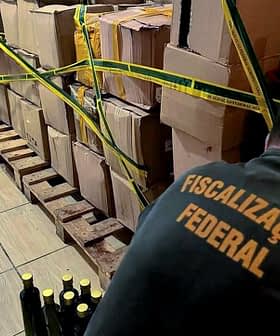Reports of adulterated olive oil and olive oil fraud are not new in the U.S. where for a long time European olive oil exporters have been taking advantage of American naïveté and an absence of quality standards. So why has everyone been talking about a recent UC Davis Olive Center report that found some olive oils bought from California supermarkets were not what they claimed to be?
The last time imported olive oil took such a bashing was an August 2007 exposé by Tom Mueller in the New Yorker magazine titled Slippery Business — The Trade in Adulterated Olive Oil. The report detailed a pervasive culture of olive oil adulteration that shocked readers and permanently altered the way a lot of us think about mass-market olive oil.
The Davis report, posted here two weeks ago, has enjoyed the kind of viral publicity only eye-grabbing titles like “That Olive Oil’s No Virgin” could achieve. The report’s conclusion that “most imported extra virgin olive oils are not extra virgin” has proved compelling. The story reinforced cynicism we’ve long harbored. Pair that with virgin word-play and you have a news editor’s best friend. 500 news editors in fact, judging by a Google News search.
The Report and its aftermath:
July 14: Report: Most Imported Extra Virgin Olive Oils Aren’t Extra Virgin
July 15: UC Davis Study Questioned
July 16: Industry Group Responds to UC Davis Olive Oil Report
July 26: Davis Olive Center Chemist, NAOOA’s Bauer on NPR
July 27: IOC Weighs in on Davis Olive Oil Study
Another reason the report garnered so much attention is the surging popularity of olive oil, due to the steady stream of health findings and celebrity raves in recent years. Thank California for much of the great PR olive oil has had lately. California makes just 1 percent of the olive oil we consume and, with every headline like “Report Questions Imported Olive Oil’s Virginity,” you can expect that number to rise.
Obviously some aren’t too happy about the way this is headed. First, the North American Olive Oil Association jumped in with a statement that sought to calm consumers by outlining how, together with the International Olive Council, hundreds of tests are performed every year on imported olive oils, and the NAOOA is here to make sure we get what we pay for.
Then the Executive Secretariat of the International Olive Council piled on with a harsher tone in a statement that accused the Davis report of basing its findings on a sampling it called “statistically not significant,” using methods that were found to be “unreliable” and reaching conclusions without the usual crosschecks. In short, the IOC said, the report failed to provide evidence for its claims. Then, with the IOC watching its back, the NAOOA issued another release with more bravado titled “IOC Blasts California Study.”
When asked by the Olive Oil Times about the specific IOC criticisms including the small sampling and the report’s controversial methodologies, the UC Davis Olive Center’s Director responded today only with:
“UC Davis stands behind the report, which was conducted with an IOC-accredited lab using official IOC tests. The Australian Oils Research Laboratory does excellent work.
At the same time, UC Davis values the IOC’s role in olive oil standards and tests. We invite the IOC to be a partner in our future research to analyze the quality of olive oil sold in the United States.”
Dan Flynn, UC Davis Olive Center
So where is all of this going?
Olive oil deception is real. Even the NAOOA trade group of importers says 10% of oils they test have some kind of problem. That would be about 10 million liters of rip-offs, one of which might be in your cupboard right now. Olive oil fraud is committed on a huge scale by giant producers in Spain, Italy, Greece and Tunisia.
The culture and mechanisms that perpetuate the practice simply don’t exist in the ‘States where the biggest companies, still small by European standards, are focused on production efficiency and the market’s high end.
There are also producers in these countries and elsewhere, like many profiled in these pages, indelibly committed to excellence and who craft an extra virgin olive oil that can be made nowhere else in the world but on their farm. That’s why we write about it. It’s why we love it. Every extra virgin olive oil is different, and there are exquisite extra virgin olive oils of the highest order made in Spain, Italy, Greece, Tunisia, California and regions all over the world, thank goodness. Of course, how much of the good stuff makes it to our local supermarkets is a cause for constant concern, and the subject of this study.
What’s bothersome about this Davis initiative is that it was financed in part by those who have the most to gain by its findings. Davis’s close ties to the local olive oil industry that pays its bills leaves the study vulnerable to criticism. Still, they could have used even more funding if that would have afforded the testing of a reasonable sampling.
The IOC pledged in its statement to work closely with the United States to protect US consumers from mislabeled olive oil. For its part, the United States will probably use what little money it has scrutinizing shipping containers for things other than adulterated olive oil.
Still, the recent USDA revision of olive oil standards brings us a little closer to a day when we can be reasonably sure ALL olive oil we buy here is what it claims to be. Until that happens the reputation of imported olive oil will likely continue to take shots, some fair and others not so.








